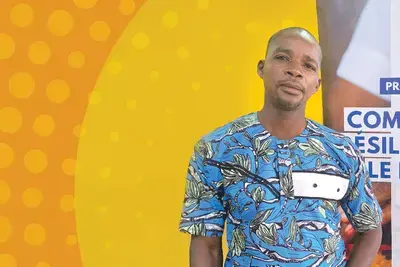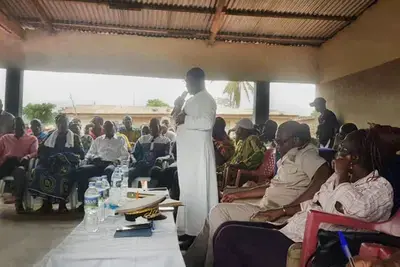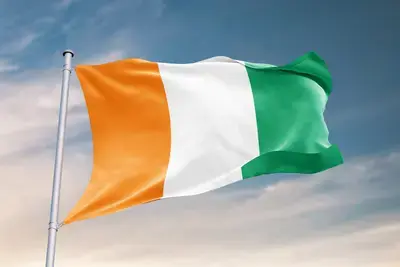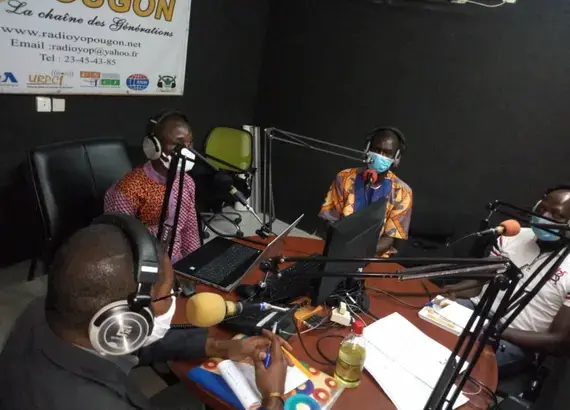
FOSCAO organized a radio program discussing measures against COVID-19 in Yopougon
Success Story
Politics and COVID-19 Clash in Côte d’Ivoire
In Yopougon, a suburb of Côte d’Ivoire’s economic capital Abidjan, angry youth gathered on the evening of April 5th to destroy a planned COVID-19 testing center. This testing center was one of many the government was constructing across Abidjan in response to an increasing number of cases -- 261 as of April 5th. But in contrast to citizens around the world all demanding not just more tests, but more accessible tests, the young people in Yopougon had a very different reaction to the government’s COVID-19 response. Why?
Protestors told NDI’s partner West African Forum for Civil Society Organizations - Côte d’Ivoire (FOSCAO) that they had not been consulted about the testing site. Some were largely unaware of the number of COVID-19 cases -- approximately 50 several days later -- in their neighborhood and many of the protesters believed the construction site was for a COVID-19 treatment center. One protester said, “There is nothing to justify the government setting up a COVID-19 center in Yopougon, which has no reported cases. This measure would rather promote the spread of the virus in the commune.” Another protester told FOSCAO, “We don’t know what this center is here for. To accept it is to accept death. They want to kill us.” In response, a government official told FOSCAO “We don’t have the time right now to meet with the people before every initiative in this health crisis,” making clear communication was not a priority. But, again, why?
One possible answer to these questions: politics. The government is dominated by the political alliance Rally of Houphouëtists for Democracy and Peace, while Yopougon is one of the most opposition-friendly areas near Abidjan, full of supporters of former President Laurent Gbagbo and his opposition party Ivoirian Popular Front. As officials prepare for a presidential election at the end of October 2020, and voter registration is set to begin in the coming months, the Yopougon residents saw the government’s COVID-19 testing plan as yet another political scheme.
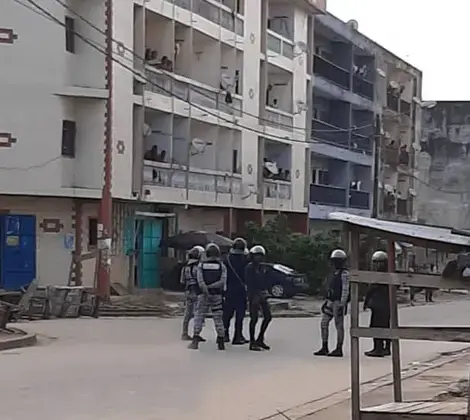
FOSCAO concluded that dissatisfaction with both the national registration process and the rollout of COVID-19 testing centers could have been prevented through better communication between the government and residents. In a statement, FOSCAO urged the government to engage with the residents of Yopougon to clear up confusion about the nature and importance of the testing center. The lack of transparency and communication from the government with community representatives, as well as the rapid spread of misinformation about the purpose of the testing center among local residents, created a climate of fear and mistrust.
To help build trust and improve communication, FOSCAO brought together the Mayor’s Chief of Staff with community and political party representatives on a local radio station. They all shared what citizens and the government need to do to address COVID-19. During the program, the Mayor’s Chief of Staff reassured the population, saying “I understand that there is a lot of false information… but the government would not set up testing centers [to halt the spread of the disease] just to contaminate its population.” In addition, FOSCAO met with youth group leaders and residents of Yopougon to reiterate accurate information about the COVID-19 testing center. FOSCAO’s continued engagement with government and civic leaders helped calm the situation, and enabled the testing site’s completion in late April.
The unpredictable nature of the COVID-19 health crisis presents a number of challenges that are easily inflamed by governance failures and rampant misinformation. In a highly polarized political environment like in Côte d’Ivoire, the response to COVID-19 is further challenged by low public trust. However, FOSCAO’s leadership shows that civil society, in these instances, is able to bridge divides by improving communication. To mitigate public uncertainty, encourage government transparency, and promote peaceful elections in October, the work of citizen organizations like FOSCAO will undoubtedly continue to be instrumental.
This program is supported by a grant from the United States Agency for International Development (USAID).
